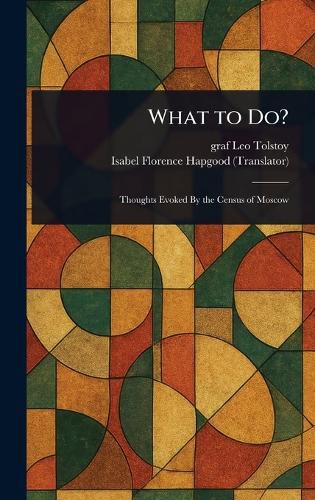Readings Newsletter
Become a Readings Member to make your shopping experience even easier.
Sign in or sign up for free!
You’re not far away from qualifying for FREE standard shipping within Australia
You’ve qualified for FREE standard shipping within Australia
The cart is loading…






This title is printed to order. This book may have been self-published. If so, we cannot guarantee the quality of the content. In the main most books will have gone through the editing process however some may not. We therefore suggest that you be aware of this before ordering this book. If in doubt check either the author or publisher’s details as we are unable to accept any returns unless they are faulty. Please contact us if you have any questions.
Leo Tolstoy's "Thoughts Evoked By The Census Of Moscow" offers a compelling glimpse into the social conditions of late 19th-century Moscow. Prompted by his participation in the Moscow census, Tolstoy reflects on the stark realities of social inequality prevalent within the city. This insightful work delves into the lives of the city's inhabitants, providing a nuanced perspective on the demographic landscape and the challenges faced by different social strata.
Tolstoy's observations raise profound questions about poverty, injustice, and the moral obligations of society. His analysis resonates beyond its historical context, prompting enduring reflection on urban sociology and the complexities of social stratification. A valuable resource for those interested in Russian social history, demography, and the works of Tolstoy, this edition presents the author's critical analysis in a meticulously prepared, accessible format.
This work has been selected by scholars as being culturally important, and is part of the knowledge base of civilization as we know it.
This work is in the public domain in the United States of America, and possibly other nations. Within the United States, you may freely copy and distribute this work, as no entity (individual or corporate) has a copyright on the body of the work.
Scholars believe, and we concur, that this work is important enough to be preserved, reproduced, and made generally available to the public. We appreciate your support of the preservation process, and thank you for being an important part of keeping this knowledge alive and relevant.
$9.00 standard shipping within Australia
FREE standard shipping within Australia for orders over $100.00
Express & International shipping calculated at checkout
This title is printed to order. This book may have been self-published. If so, we cannot guarantee the quality of the content. In the main most books will have gone through the editing process however some may not. We therefore suggest that you be aware of this before ordering this book. If in doubt check either the author or publisher’s details as we are unable to accept any returns unless they are faulty. Please contact us if you have any questions.
Leo Tolstoy's "Thoughts Evoked By The Census Of Moscow" offers a compelling glimpse into the social conditions of late 19th-century Moscow. Prompted by his participation in the Moscow census, Tolstoy reflects on the stark realities of social inequality prevalent within the city. This insightful work delves into the lives of the city's inhabitants, providing a nuanced perspective on the demographic landscape and the challenges faced by different social strata.
Tolstoy's observations raise profound questions about poverty, injustice, and the moral obligations of society. His analysis resonates beyond its historical context, prompting enduring reflection on urban sociology and the complexities of social stratification. A valuable resource for those interested in Russian social history, demography, and the works of Tolstoy, this edition presents the author's critical analysis in a meticulously prepared, accessible format.
This work has been selected by scholars as being culturally important, and is part of the knowledge base of civilization as we know it.
This work is in the public domain in the United States of America, and possibly other nations. Within the United States, you may freely copy and distribute this work, as no entity (individual or corporate) has a copyright on the body of the work.
Scholars believe, and we concur, that this work is important enough to be preserved, reproduced, and made generally available to the public. We appreciate your support of the preservation process, and thank you for being an important part of keeping this knowledge alive and relevant.